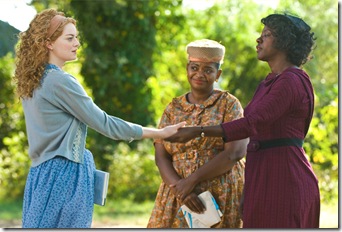In the early ‘60s, when the Deep South was segregated, yet many rich white families had ‘help’ to cook, clean and raise their children, the inequality of ‘separate but equal’ was being seriously challenged for the first time, there were as many unsung idealists who helped pave the way for the civil rights movement to succeed. The Help is based on a novel about one such idealistic person – Skeeter, a young, college educated woman who persuades ‘the help’ to tell their stories for publication – and the two maids, Aibileen and Minny, who risk everything to share their stories with her.
Skeeter [Emma Stone] persuades the local newspaper editor to give her a job – answering questions in a housekeeping column for which she is totally unqualified – and then decides to follow the advice from an editor [Mary Steenburgen] with a major publisher in New York – find something you care about and write about it.
When she encounters the casual racism that she didn’t notice before she went off to college, inspiration strikes. She’ll write about ‘the help’ – from their perspective. That one decision brings her into a world that she never dreamed existed – and winds up forging a friendship with two wildly divergent women – Aibileen [Viola Davis] and Minny [Octavia Spencer].
Set in the ‘60s, in the midst of the civil rights movement, The Help seems, at first, to be Skeeter’s story but quickly becomes the story of Aibileen and Minny – the first of more than a dozen maids who will eventually allow Skeeter to interview them.
When Skeeter begins interviewing Aibileen, she discovers that Aibileen has actually written out stories about her life; stories that are deeper and richer than her questions might have drawn out. The telling of these stories – and Skeeter’s willingness to respect Aibileen enough to tell the bad with the good – creates a bond between the two women. Through Aibileen, Skeeter meets Minny, who talks herself out of not taking part in the book in a manner that is simultaneously hilarious and poignant.
While Skeeter’s book is the most obvious level of storytelling here, the story of these women who raise other people’s children as well as doing the cooking and cleaning, there’s a lot of other stuff going on, too.
There’s Hilly Holbrook [Bryce Dallas Howard], the local head of the Junior League and the biggest hypocrite in town – while she raises funds for the children of Africa, she’s also trying to initiate a program that would require the homes of every white who employs colored help to install separate bathrooms for them [and that’s just one part of her proposal]. Sissy Spacek has a small but memorable role as Hilly’s mother – a woman of wandering memories but sharp enough to realize what a monster her daughter is and to be delighted when she gets her comeuppance.
Then there’s Elizabeth Leefolt [Ahna O’Reilly], whose racism is magnified through Hilly’s bullying, and social outcast Celia Foote [Jessica Chastain], who is so thrilled to be hiring a maid [Hilly has put out word to everyone that This Shall Not Happen] that she hugs Minny when she agrees to take the job [how Minny comes to be looking for work – and her actions thereafter – is an exquisitely funny and scandalous tale that must be seen to be believed].
Even Skeeter’s mother, the majestic yet easily influenced Charlotte [Allison Janney] has a surprising skeleton in her closet – one that deeply affects her daughter.
Just about every performance in The Help is worthy of awards consideration, but Davis, Spencer and Stone are right at the forefront. Davis gives real life to Aibilene’s warmth, generosity of spirit and determination to raise her charges well; Spencer keeps Minny’s sass from becoming clichéd by making it a survival skill rather than the product of a mean spirit [though if anyone deserves to be mean-spirited…], and Stone takes Skeeter from dewy-eyed idealist to genuine involvement and love without even seeming to be doing anything.
Stephen Goldblatt’s cinematography is lush and detailed. The way he shifts palettes between the homes of the whites and the help subtly reinforces the obvious differences while ultimately serving the storytelling.
Thomas Newman’s score is remarkable because it’s practically subliminal; a good score does not call attention to itself. Plus the choice of songs to deepen the soundtrack range from playful to political [Bo Diddley to Bob Dylan].
First-time director Tate Taylor, working from his own screenplay, makes a pretty big splash with The Help. Since I haven’t read Kathryn Stockett’s novel, I can’t say how faithful the movie is, but I can say that it will make you laugh and cry – and you will not believe that its running time is almost two-and-a-half hours. You may even feel like applauding – like the audience at the screening I attended.
It looks like Oscar® season is underway.
Grade: A
Photo courtesy of DreamWorks/Touchstone Pictures

“The Help” is a film about race relations in Mississippi during the 60’s based on a popular novel. The central character is an unmarried white woman who becomes interested in writing about the life experiences of the black women who work in her hometown. This is primarily a long ‘chick flick’ with good performances and a lot of work to recreate the era.
GRADE = “A-“